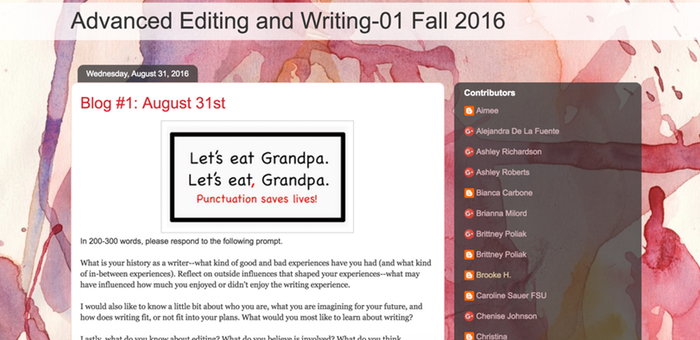OBJECTIVE: To write blog posts “to make connections across readings and to organize [my] thoughts before class discussions.”
I’ve listed the prompts for each of our class blogs below. Read my responses to the prompts, collected in one document.
Blog #1 – Aug 31
In 200-300 words, please respond to the following prompt.
What is your history as a writer – what kind of good and bad experiences have you had (and what kind of in-between experiences). Reflect on outside influences that shaped your experiences – what may have influenced how much you enjoyed or didn’t enjoy the writing experience.
I would also like to know a little bit about who you are, what you are imagining for your future, and how does writing fit, or not fit into your plans. What would you most like to learn about writing?
Lastly, what do you know about editing? What do you believe is involved? What do you think copyeditors do?
Blog #2 – Sep 7
The Copyeditors Handbook suggests that in order to meet quick deadlines, copyeditors should perform “editorial triage,” or prioritize which tasks are most important and which ones can be ignored for the time being. After reading over the paragraph below, list the errors you would address first. Then explain why you would prioritize these errors. Then list the errors you would address if you had a longer deadline.
Nitrogen is an elemant essential to all life but nitrogen compounds are “extras largely produced thorugh energy consumption. The nitrogen cycle is affected by nitrogen dioxide and when high temperature oxidation and chemical conversions form nitrodgen dioxide physical effects are possible for example NO2 forms the depressing brown in smog, irritates our eyes, and blurs our envirnoment. In animal studies, NO2 has been also shone to be the most dangerous among the eight nigrogen oxides. Inhaled, NO2 reacts quickly with lung tissue and causes cell injury and cell death. Therefore, NO2 can cause major damage on lung tissues and cells. Biochemical experiments indicate that the region of the lung most responsible for respiration, the region bounded by the terminal respiratory bronchioles and the alviole, is most affected by inhaled NO2.
Blog #3 – Sep 14
Punctuation can be frustrating. Depending on how you were taught, you may follow steadfast grammar and syntactical rules for using punctuation, or you may have been taught to use punctuation aurally (by sound) or visually. In about 200 words, discuss how you were taught to use punctuation. Are there any punctuation rules that have stuck with you throughout the years (for example, rules for using commas, semicolons, periods, dashes, etc)? If so, list some of the rules that you remember.
Blog #4 – Sep 28
- What kinds of texts does the journal typically publish?
- Why would your composition be a good fit for this publication?
- What is the word count, citation style, and format?
Blog #5 – Oct 3
Chapter 15 points out several structural, conceptual, and stylistic problems that you may run into while providing feedback on your peer’s paper. In your opinion, which five are the most important issues to focus on while providing feedback? Please explain your answer.
Blog #6 – Oct 17
After reading about genre, please explain the term genre in your own words. Then, list two kinds of genres that you’ve composed in (for example, blog, academic essay, fiction writing, online or newspaper article, diary or memoir, etc.) Lastly, explain some of the different features of the two genres that make them distinct from each other in terms of purpose, audience, rhetorical appeals, style, and design.
Blog #7 – Oct 24
After receiving feedback from your peers, what would you say are the strengths of your article? What are the weaknesses? What is your plan for moving forward with your article draft? What will you add, remove, or change?
Blog #8 – Nov 2
Do you agree with Rik Hunter in “Hypersocial-Interactive Writing: An Audience of Readers-As-Writers” that writing in digital wiki spaces changes the roles that writer and audience traditionally occupied in print spaces? If so, please explain how you believe the roles have changed and give an example. If not, please give an example of how the roles have not changed.
Blog #9 – Nov 14
7. What will the temporal lifespan be? (how long will the works be in circulation?)
Blog #10 – Dec 7
Based on your experiences writing and editing different kinds of texts in this class, did your process for writing and editing change when moving from print to digital and online spaces? Please explain. What would you say was your favorite project? What was your least favorite project? Please explain. If you could add another writing/editing project to this class, what would it be?
